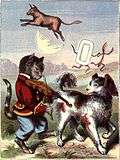Here Comes an Old Soldier from Botany Bay
Here Comes an Old Soldier from Botany Bay, commonly known as Here Comes an Old Soldier or just Old Soldier, is a nursery rhyme and children's game found in Australia, the United States, and the British Isles. The game and rhyme date to at least the late nineteenth century.[1]
Lyrics
Here comes an old soldier from Botany Bay,
Have you got anything to give him to-day.
The idea being for each person in turn to name and item and then others add theirs until a long list has to be remembered.
For example:
Caller: Here comes an old soldier from Botany Bay,
Have you got anything to give him to-day?
First person: I'll give him a hat
Caller: Here comes an old soldier from Botany Bay,
Have you got anything to give him to-day?
Second person: I'll give him a hat and a dog
Caller: Here comes an old soldier from Botany Bay,
Have you got anything to give him to-day?
First person: I'll give him a hat, a dog and a meat pie.
And so on until the list is so long no one can remember it. The funnier the items, the better the game.
Origin and Variations
G. K. Chesterton wrote of the poem as a "beggars' rhyme" during his childhood in late nineteenth-century London, and quoted the words as thus:
Here comes a poor soldier from Botany Bay:
What have you got to give him to-day?[1]
- ^ G.K. Chesterton, The Illustrated London News, December 22, 1934.
Books of children's games published at the turn of the century show that by the 1890s the rhyme had developed into a game of taboo words.[1][2][3]
Various other games incorporating the rhyme emerged in the twentieth century, most notably a slew of local adaptations that replaced the "old soldier from Botany Bay" with an "old woman from Botany Bay."[4]
References in other works
The game is mentioned in Keble Howard's 1908 book "Miss Charity: A Tale From My Heart"[5]
The poet Mary Finnin has written a ballad entitled "Here Comes an Old Soldier from Botany Bay".[6]
References
- 1 2 George Laurence Gomme, A Dictionary of British Folklore, (London: David Nutt, 1898), 24.
- ↑ Joseph Wright, The English Dialect Dictionary, (London: Henry Frowde, 1898), 339.
- ↑ Edward Verrall and Elizabeth Lucas, What Shall We Do Now?: A Book of Suggestions for Children's Games and Employments, (London: Grant Richards, 1900), 10.
- ↑ Dorothy Howard, "Folklore of Australian Children", Keystone Folklore Quarterly 10, no. 1 (Spring, 1965): 103-104 & 115.
- ↑ K. Howard, Miss Charity: A Tale from My Heart (London: Hodder and Stoughton, 1908), p. 107.
- ↑ L. J. Blake, Australian Writers, (Rigby, 1968), p. 217.
